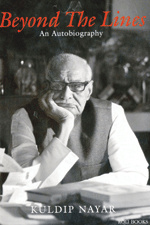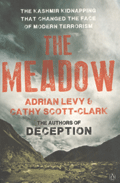Beyond the Lines by Kuldip Nayar; Roli Books; Price: Rs.595; 420 pp
 One of the few positive developments in these depressing times is the coming of age of India’s book publishing industry. Within the past decade, this industry has evolved with the ready publication of memoirs and autobiographies of captains of industry, political leaders and activists positioned to provide insiders’ perspectives of the confusing history of post-independence India. Among such new genre books welcomed on this page for enlightening perspectives and the grist they provide to serious historians are the memoirs of construction magnate K.P. Singh and the late Union minister Arjun Singh, and the non-fiction works of Katherine Boo (Beyond Beautiful Forevers) and banker-economist Ruchir Sharma (Breakout Nations). To this list, add Beyond the Lines by veteran journalist Kuldip Nayar.
One of the few positive developments in these depressing times is the coming of age of India’s book publishing industry. Within the past decade, this industry has evolved with the ready publication of memoirs and autobiographies of captains of industry, political leaders and activists positioned to provide insiders’ perspectives of the confusing history of post-independence India. Among such new genre books welcomed on this page for enlightening perspectives and the grist they provide to serious historians are the memoirs of construction magnate K.P. Singh and the late Union minister Arjun Singh, and the non-fiction works of Katherine Boo (Beyond Beautiful Forevers) and banker-economist Ruchir Sharma (Breakout Nations). To this list, add Beyond the Lines by veteran journalist Kuldip Nayar.
The merit of this book diligently written over 20 years by its octogenarian author, are its vast sweep and unique insider’s insights provided by a dogged, self-made individual who lost all material advantages in the horror of the partition, and through sheer effort and tenacity rose to several prestigious positions in government, journalism and the diplomatic corps. Two parallel narratives trace the career graph of the author and his unique — indeed unprecedented — interface with modern Indian history and leaders who shaped it. For the past six decades, Nayar has been reporting from the heart of the Delhi imperium, and offers close-up and usually unflattering portraits of the men and women who botched independent India’s high-potential national development effort.
Dispossessed of all ancestral property in Sialkot where his father was a successful medical practitioner and beginning his life as a refugee in India with a capital of Rs.120, Nayar began his career as a reporter in an Urdu-medium daily. The personal strand of the narrative traces his switch to English journalism which began when he was an officer in the Central government’s Press Information Bureau (PIB). Despite a degree in journalism from the prestigious North-Western University, USA he couldn’t land a job in any English language newspaper. This proved a blessing in disguise as he was deputed to serve as the information officer of Union home minister Govind Ballabh Pant and later Lal Bahadur Shastri who succeeded Jawaharlal Nehru as India’s prime minister in 1964.
Nayar’s stint in PIB in the early years of independence enabled him to acquaint with a variety of powerful and emerging politicians including Nehru, Shastri, Indira Gandhi, Morarji Desai, JP and numerous state-level political leaders. Keenly aware of prevailing ideas and events, Nayar emerged as the official chronicler of the times, providing first-hand information to newspapers subscribing to the United News Agency of India (UNI) started by Nayar.
Simultaneously, the personal narrative is interspersed with political history. It comprehensively traces the formation of the socialist Nehruvian state, the jockeying for power after Nehru’s socialist fantasy ended in the humiliation of the Indo-China border war of 1962, the succession of Shastri as prime minister, his untimely and suspicious death in Tashkent and the succession of Indira Gandhi after the historic split in the Congress party in 1969. Following the ascension of Mrs. Gandhi to the prime minister’s office, Nayar charted a path away from the Congress and government, quit UNI and launched his career as a journalist with The Statesman, as its Delhi-based resident editor in 1967. That’s when he began writing his weekly column Between the Lines which has run for the past 45 years and is syndicated with 80 newspapers in 14 languages countrywide.
The complex picture that emerges during the Emergency and Mrs. Gandhi’s rapid descent into authoritarianism is detailed and harshly critiqued by Nayar. But as an uncompromising critic of the Emergency during which the icons of Indian journalism “not only bent but crawled”, Nayar (then with the Indian Express) paid a stiff price for speaking up. He was perhaps the only journalist to be imprisoned for over 90 days. In a 48-page chapter titled ‘The Emergency and After’, the author unsparingly reminds the nation how the media, judiciary and brittle establishment capitulated during this shameful interregnum of modern Indian history.
Beyond the Lines has much more to offer on events of historical significance and their wider consequences. The rapid rise and fall of the Janata government (1977-79), the storming of the Golden Temple in Punjab (1984) and assassination of Mrs. Gandhi the same year, the succession of her son Rajiv as prime minister and national disillusionment in the aftermath of the Bofors scandal, are all catalogued with considerable depth. After Rajiv Gandhi’s largest parliamentary majority in Indian history was reduced to less than half in the general election of 1989, his former finance minister and bête noire V.P. Singh succeeded as prime minister, supported by an unlikely combination of the BJP and communist parties. During its two-year period in office, despite reservations, Nayar accepted the government’s offer to serve as India’s high commissioner in Britain, seduced by foreign minister Inder Gujral’s argument that London was the hub of the Khalistan movement and as ambassador, Nayar “might be able to bring the Sikh community into the mainstream”.
Framed within the vast sweep of Nayar’s intellectual and political life, Beyond the Lines is readable and relevant. But it is a flat, first-hand narrative, unbothered about citing secondary sources to back up Nayar’s claims, assertions and often sweeping judgements of actors and events on the national stage. This ‘personalisation’ sometimes strains the reader’s credibility. A second downside of this autobiography is its news reporter’s style — heavy on facts and light with analyses. The reader won’t find deep cause and effect analyses of the momentous events which have shaped the history of post-independence India.
In consonance with the temper of the times, Beyond the Lines ends on a gloomy note. Nayar does not have much faith in generation next which he believes is “taking to careerism and consumerism” instead of working to build an egalitarian society and strong democracy. To that extent this memoir of perhaps the last of India’s great liberals genuinely committed to secularism and democracy, is a sad lament which all right-thinking citizens would do well to read, and reflect upon.
Dilip Thakore
Murky tragedy
The Meadow by Adrian Levy and Cathy Scott-Clark; Penguin Books; Price: Rs.499; 510 pp
 This is a discomfiting book on Kashmir, a subject with which this reviewer has never been at ease. India obtained possession of the Kashmir valley under controversial circumstances. A Muslim-majority kingdom, it should logically have been co-opted by Pakistan when the subcontinent was divided in 1947, and the princely states were asked to choose which nation they wanted to join.
This is a discomfiting book on Kashmir, a subject with which this reviewer has never been at ease. India obtained possession of the Kashmir valley under controversial circumstances. A Muslim-majority kingdom, it should logically have been co-opted by Pakistan when the subcontinent was divided in 1947, and the princely states were asked to choose which nation they wanted to join.
However, Kashmir had a Hindu ruler (Maharaja Hari Singh) who initially wanted to be independent of both new nations. But when marauding Pakistani ‘tribesmen’, backed by regular troops reached the outskirts of Srinagar, he panicked and solicited Indian intervention, hastily agreeing to sign an Instrument of Accession in favour of the new Indian State. Indian troops were immediately airlifted to Srinagar and pushed the raiders back.
At the time Kashmir’s popular leader, Sheikh Abdullah (whose grandson is now chief minister), was pro-India and the Kashmiris would probably have wanted to accede to India, rather than Pakistan. But Jawaharlal Nehru, the democrat that he was, felt guilty enough about India’s use of armed force to declare that after hostilities ended, there would be a plebiscite in the state to determine whether Kashmiris wanted to be part of India or Pakistan. The plebiscite was never held.
Since then there’s been sustained militancy in the state of Jammu & Kashmir. Islamabad, ever eager to extract revenge for the humiliating battlefield defeats of 1948, 1965 and 1971, has thrown its full weight behind Kashmiri militants, training and arming them.
Against this complex landscape, The Meadow is a riveting narrative of the kidnapping of six western tourists — two Americans, two Britons, a German and a Norwegian — trekking in Kashmir in the summer of 1995. One of the captives managed to escape, but the Norwegian was brutally beheaded. The remaining four were never found. The authors are prize-winning British investigative journalists whose earlier book, Deception, on how Pakistan built its nuclear bomb, received worldwide acclaim. In the book under review they attempt to unravel the mystery of the four missing hostages. Their conclusion is chilling: they were most probably killed by Indian security forces.
How they come to that conclusion is the compelling core of The Meadow. The painstaking investigation and interviews with key protagonists under trying conditions make for a convincing case, which significantly hasn’t been contradicted by New Delhi or Indian Army spokespersons.
The book derives its title from a meadow where the tourists were abducted by a militant outfit styled Al Faran. In exchange for freeing the innocent victims, Al Faran demanded the release of some key terrorists, including Masood Azhar and Omar Sheikh, lodged in Indian jails. Nothing came of the negotiations and Al Faran was obliterated by the Indian security forces. But according to the authors, before that fatal encounter the terrorists had freed the hostages. This is where the narrative gets a little murky. To whom were they surrendered? Another terrorist outfit or Indian security forces?
According to the authors, the Indian Army/Border Security Force held them for some time, during which the hostages learnt too much about their human rights violations in Kashmir. And so, they had to be silenced forever. “We have really lost our humanity,’’ a detective of the crime branch is quoted as saying, “this is the price of so many years of war’’.
The sequel to this tragic kidnap drama is equally revealing. On December 24, 1999, an Indian Airlines plane, flying between Kathmandu and Delhi was hijacked to Kandahar in Afghanistan. The (BJP) government in Delhi supinely caved in to the hijackers’ demands and released Masood Azhar and Omar Sheikh, among other terrorists. It was a monumental error, for which India has paid — and continues to pay — dearly. After his release Azhar masterminded several major terrorist attacks on Indian territory, including an infamous attack on Parliament, in which 12 people were killed. Omar Sheikh plotted the kidnapping and subsequent liquidation of American journalist, Daniel Pearl, for which crime he has been sentenced to death (he is in jail in Pakistan pending hearing of his appeal).
The status of Kashmir has been a long-drawn-out tragedy in which not only India and Pakistan, but other nations also have suffered. The sooner it is resolved, even if this means giving the state maximalist autonomy, the better.
Rahul Singh























